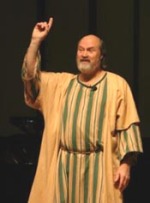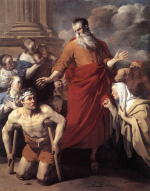 Experiencing/Example Of All Five
Experiencing/Example Of All Five
Evangelist: Peter before Pentecost denies Jesus in the temple fulfilling personal prophecy Jesus proclaimed over him. This new transformed Peter now returns to the temple and boldly preached the evangelistic message. Acts 4 records his evangelistic dissertation. Result, 3000 join the ranks of believers.
 Shepherd/pastor: In the twenty-first chapter of John this same Peter who denied Jesus three times faces a resurrected Jesus who asks Peter three times, “Do you love me?” Upon Peter’s confirmation of his love, Jesus replies then, “Feed my sheep.” Shepherding became so overwhelming that one of the first delegation of responsibilities from the Apostles to other believers is recorded in Acts 6. The Apostles elect seven men “filled with the Holy Spirit and wisdom” to become the Church’s first official shepherds/pastors.
Shepherd/pastor: In the twenty-first chapter of John this same Peter who denied Jesus three times faces a resurrected Jesus who asks Peter three times, “Do you love me?” Upon Peter’s confirmation of his love, Jesus replies then, “Feed my sheep.” Shepherding became so overwhelming that one of the first delegation of responsibilities from the Apostles to other believers is recorded in Acts 6. The Apostles elect seven men “filled with the Holy Spirit and wisdom” to become the Church’s first official shepherds/pastors.
 Teacher: Stick your foot in your mouth Peter, now after Pentecost, speaks with authority in the temple teaching about Jesus’ mission to earth and the implications of that event as recorded in Acts 2. Untrained academically, without any higher educational degree, a fisherman by trade, Peter amazes the leaders in the temple because he teaches with authority. The results: The Apostles Teaching. The same principles taught by Peter in Acts 2 in front of the Sanhedrin are the same principles taught by Stephen in Acts 7 before his being stoned to death.
Teacher: Stick your foot in your mouth Peter, now after Pentecost, speaks with authority in the temple teaching about Jesus’ mission to earth and the implications of that event as recorded in Acts 2. Untrained academically, without any higher educational degree, a fisherman by trade, Peter amazes the leaders in the temple because he teaches with authority. The results: The Apostles Teaching. The same principles taught by Peter in Acts 2 in front of the Sanhedrin are the same principles taught by Stephen in Acts 7 before his being stoned to death.
 Prophet: Peter just wanted to be a good Apostle and pray, but while praying he has a prophetic experience as recorded in Acts 10. He has a spiritual vision of sheets, pigs, unclean creatures dropping out of heaven and realizes the message of the vision, what was once unclean is now clean. This vision tested his obedience to go to the house of Cornelius, a non-Jew to proclaim the message of Jesus. The results: Breaking down the barrier between Jew and Gentile allowing all to be saved, come into the kingdom of God, and setting up the Church’s first battle recorded in Acts 15 at a council in Jerusalem, where in UNITY the Church settles the issue for all centuries.
Prophet: Peter just wanted to be a good Apostle and pray, but while praying he has a prophetic experience as recorded in Acts 10. He has a spiritual vision of sheets, pigs, unclean creatures dropping out of heaven and realizes the message of the vision, what was once unclean is now clean. This vision tested his obedience to go to the house of Cornelius, a non-Jew to proclaim the message of Jesus. The results: Breaking down the barrier between Jew and Gentile allowing all to be saved, come into the kingdom of God, and setting up the Church’s first battle recorded in Acts 15 at a council in Jerusalem, where in UNITY the Church settles the issue for all centuries.
 Apostle: Peter goes from being a brash, bumbling, big mouth, bull headed, believer in Jesus, to a man who is granted the vision of seeing the birth of the Church as a whole and its implications. He is to proclaim the gospel, to nurture the new Church, to desire a more intimate relationship with the resurrected Jesus, and is granted the vision to see the Big Picture. He becomes the point man of the Church in Jerusalem with the other eleven as in unity they lead this new Church in physical and spiritual growth, through joys and persecution, needs to fulfillment, pressing on in vision. The book of Acts records the “acts of the apostles”. After Pentecost Peter and the other eleven were forced to put their faith into “Acts”-tion.
Apostle: Peter goes from being a brash, bumbling, big mouth, bull headed, believer in Jesus, to a man who is granted the vision of seeing the birth of the Church as a whole and its implications. He is to proclaim the gospel, to nurture the new Church, to desire a more intimate relationship with the resurrected Jesus, and is granted the vision to see the Big Picture. He becomes the point man of the Church in Jerusalem with the other eleven as in unity they lead this new Church in physical and spiritual growth, through joys and persecution, needs to fulfillment, pressing on in vision. The book of Acts records the “acts of the apostles”. After Pentecost Peter and the other eleven were forced to put their faith into “Acts”-tion.







 A
A












 I
I
